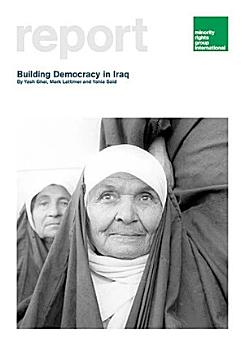Building Democracy in Iraq
About this ebook
About the author
Minority Rights Group International (MRG) is a non-governmental organization (NGO) working to secure the rights of ethnic, religious and linguistic minorities and indigenous peoples worldwide, and to promote cooperation and understanding between communities. Our activities are focused on international advocacy, training, publishing and outreach. We are guided by the needs expressed by our worldwide partner network of organizations, which represent minority and indigenous peoples. MRG works with over 300 organizations in nearly 60 countries. Our governing Council, which meets twice a year, has members from 10 different countries. MRG has consultative status with the United Nations Economic and Social Council (ECOSOC), and observer status with the African Commission on Human and Peoples’ Rights (ACHPR). MRG is registered as a charity and a company limited by guarantee under English law: registered charity no. 282305, limited company no. 1544957.
Yash Ghai is the Sir Y.K. Pao Professor of Public Law at the University of Hong Kong. He has been a constitutional adviser in a number of states and the Chair of the Kenyan Constitutional Review Commission. He is the author of Autonomy and Ethnicity: Negotiating Competing Claims in Multi-ethnic States (2000).
Yahia Said is research officer at the Centre for the Study of Global Governance at the London School of Economics and Political Science. He has worked extensively on issues of political and economic transition in post-totalitarian societies with a focus on Central and Eastern Europe and the former Soviet Union. He is a Czech citizen of Iraqi origin. He had to flee Iraq in 1979.
Mark Lattimer is Director of Minority Rights Group International. He was previously the Communications Director at Amnesty International UK, and the editor of Amnesty’s Human Rights Audit of UK foreign policy. He is the co-editor of Justice for Crimes Against Humanity (Oxford, Hart Publishing, forthcoming 2003).
Professor Gudmundur Alfredsson is the Director of the Raoul Wallenberg Institute of Human Rights and Humanitarian Law at Lund University in Sweden. He is a lawyer specializing in indigenous and minority rights, and has spent 12 years working with the United Nations Secretariat in various capacities, most significantly as the former adviser to the Assistant Secretary-General for Human Rights in Geneva. He is the chair of the Academic Advisory Board of the World Intellectual Property Organisation (WIPO). He is widely and internationally consulted as an expert on inter-ethnic relations, self-determination and national minorities.
Asma Jahangir is a leading lawyer and one of Pakistan's most prominent advocates for human rights, focusing in particular on women’s rights and minorities. One of the founding members of the Human Rights Commission of Pakistan (HRCP) in 1986, she was made advocate of the Pakistan Supreme Court in 1992. In 1998 she was appointed UN Special Rapporteur on Extrajudicial, Arbitrary and Summary Executions, visiting Albania, the former Yugoslav Republic of Macedonia, Mexico, East Timor, Nepal, Turkey and Honduras. In 2001 she was awarded the UNIFEM sponsored Millennium Peace Prize. She is also a serving member of Minority Rights Group International.
Professor Donald Horowitz is currently the James B. Duke Professor of Law and Political Science at Duke University School of Law (USA), and previously served as a lawyer to the Department of Justice. The recipient of several distinguished fellowships including the Guggenheim award, in 2001 he was a Centennial Professor at the London School of Economics, and a Carnegie Scholar in 2001–2. Professor Horowitz’s book, A Democratic South Africa? Constitutional Engineering in a Divided Society (1991) won the 1992 Ralph J. Bunche Prize for the best publication in ethnic and cultural pluralism. He is the author of Ethnic Groups in Conflict (1985) and The Deadly Ethnic Riot (2001), and is at present working on a project on constitutional design for divided societies. He is widely consulted on the problems of divided societies and on policies to reduce ethnic conflict in locations including Russia, Romania, Nigeria, Tatarstan and Northern Ireland.
Max van der Stoel is the former UN Special Rapporteur on the situation of human rights in Iraq (1991–9) and former High Commissioner on National Minorities of the Organisation for Security and Cooperation in Europe (1992–2001). He was twice Minister of Foreign Affairs for the Netherlands, and from 1983 to 1996 ambassador to the United Nations.






